Outdoor access?
Let's try to shed some light on this much-debated issue!
Whatever the final decision you take, whether or not to allow your cat to roam freely outdoors, the important thing is to be fully aware of all the facts and the consequences of your choice. You'll also need to take into account your cat's character, because yes, they're all different. And also analyse your environment: the risks are obviously not the same if you're in the city, in the countryside, near a road, etc.
At Envol Munchkin, our cats live at home and have free access to the 2000 m² garden, which is fully fenced and secure. It's a lot of work and investment at the outset (because cats climb and sneak in everywhere!) but for us it's really the ideal solution, leaving each cat free to live its life according to its temperament. What's more, we've noticed that they're much more often inside with us than outside!
Outdoor hazards
First of all, you need to be aware that cats who go outside without a safe environment will not live as long as "indoor" cats because of the many dangers they face.
Road accidents Cars are a cat's number 1 enemy. For a cat, crossing the road represents a huge danger. Cats can easily be hit by a vehicle, especially if the road is busy or if they cross it at night.
The bonnet of a car : particularly dangerous if the cat is hiding underneath.
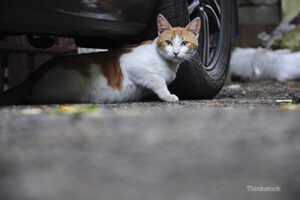
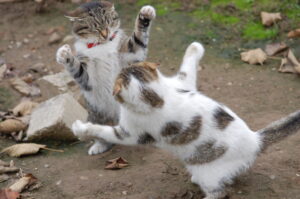
Getting lost Your kitty may wander too far or run away and get lost. He can also be "stolen" if he is sociable with humans.
Being hurt or even poisoned by people who don't like cats.
Fighting with other animals: being injured, attacked or bitten by a cat, dog or other wild animal (depending on where you live) can be very dangerous and even fatal for your cat.
Contracting an infectious disease Many outdoor cats can transmit serious contagious diseases to your cat. These common diseases include: cat leukaemia, upper respiratory tract infections, coryza, feline AIDS, infectious feline peritonitis and fungal infections.


Stocking with toxic substances Herbicides, fertilisers, slug pellets, antifreeze and rat poison are all fatal to cats.
Stocking with toxic plants lily, poinsettia, mistletoe, azalea, narcissus, philodendron and cycas ...
The pitfalls Fences: wire fences, barbed wire or a garden shed can all be dead traps for your cat.
Exposure to common parasites fleas, ticks and intestinal worms
Precautions to take

If, despite all these risks, you decide to let your cat roam outside without a fenced-in area, you should take a few precautions to keep the risks to a minimum.
Vaccinate your cat and don't forget the reminders.
Sterilise your kitty This is very important as it will reduce his desire to run away.
Deworm your cat and treat it for all parasites.
No output in your absence, neither at peak times nor at night.
And if you choose to keep your cat indoors at home, even without access to the outdoors, you'll see that it's very easy to make him the happiest of cats!
Let him choose his resting place
Your cat will need dedicated spaces. Because their environment is small, it needs to be structured, because small felines don't like mess and mixed smells. Everything has its place and you need to respect this, otherwise you'll be causing your cat stress, anxiety and discomfort.
Offer him a pleasant, warm, safe and quiet place to rest. Let him choose the most suitable spot and adapt it accordingly. Cats like to sleep in quiet places, sheltered from noise, traffic and draughts. Generally, they like to settle in several small places throughout the day. You'll notice that they can move from a bed to a sofa, a windowsill, a shelf or even a little isolated corner in a cupboard. Try to make these different spaces comfortable and pleasant.
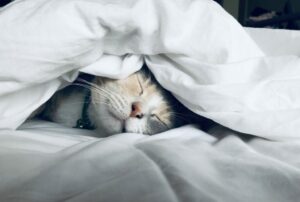

Make a clear distinction between the dining area and choose a suitable diet
The meal area is a dedicated place in its own right. Cats like to eat in peace and quiet, away from the smell of the litter box. Set up a pleasant area just for his bowls, away from noise and traffic.
Your cat must have fresh water available at all times (if possible in a different place from its food bowl) and a suitable diet - see "The cat's diet.
Think catnip. This aromatic plant is much loved by cats for its euphoric properties. What's more, it helps cats to purge naturally, which encourages the removal of hairballs, good digestion and the elimination of worms.
Matabi sticks are also extremely effective, even more so than catnip - your cats will love them!


Don't put the litter tray just anywhere!
Like us, cats are shy and do not appreciate being observed when they relieve themselves. Place its litter tray in a space away from noise and traffic. And above all, don't put it near its eating and sleeping areas! The smell will upset him, and he may abandon his bowl or get into the habit of relieving himself elsewhere. Imagine if you had to eat or sleep in your toilet...
Finally, remember to clean the litter tray to avoid accidents. Remove traces of urine and excrement every day and wash the tray once a week.
Provide hiding places and high observation posts
Cats love to hide and get up high to observe the world around them in perfect peace and quiet. They like to see without being seen. That's why you should give them free access to certain folding spaces high up on furniture or shelves. Set up areas free of knick-knacks and other objects so that he can settle in peacefully without risking breaking your precious possessions. If you can set up a small play area, that's even better!
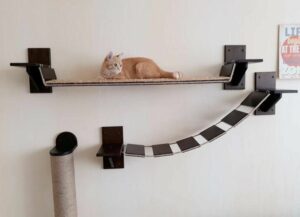
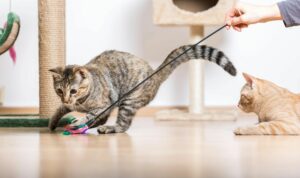
Encourage play!
Cats love to play. Since they can't go out hunting or playing, indoor cats need to be stimulated around the house. Make sure it has plenty of toys and games, some to keep it occupied on its own and others to share with you. Don't hesitate to hang small balls or feathers from furniture, let him play with small accessories, etc. A simple piece of cardboard can make a tree house. A simple cardboard box is sometimes the ideal hut for your cat to play in for several hours. Anything that helps your cat exercise is welcome. Vary the toys so that your cat doesn't get bored too quickly.
However, you should be careful not to let your child play with certain games while you're away. Keep an eye on him when he's playing, as he could swallow something or hurt himself.
Keep an eye on his behaviour
To make sure your cat enjoys life in a flat, always keep a close eye on its behaviour. If your cat is dirty, anxious or aggressive, or if it changes its eating habits (bulimia or anorexia), consult your vet. A cat that wanders quietly around the flat with its tail in the air is happy and relaxed. Make sure your cat's well-being and expectations are met, and act quickly if anything goes wrong.
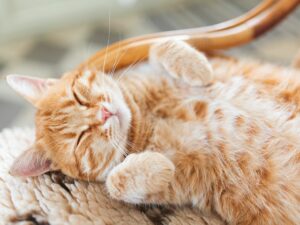

Make time for them while respecting their needs
Cats have rituals and their day is punctuated by them. They are organised animals who can easily become stressed at the slightest upset or change.
Indoor cats need peace and quiet. It's essential not to disturb them when they're alone, washing, eating or sleeping. Even if they enjoy your company, cats also need time to themselves, away from other people. Grooming, for example, is a relaxing activity that helps them to regulate their stress. So respect his need for tranquillity and don't ask him to do anything in this case.
On the other hand, you need to be there for your cat. Contrary to popular belief, cats do not enjoy solitude for long. He needs to know you're there, even if he's not always in contact with you. If you spend all your time away from home, your cat will be unhappy. Avoid going away too often and for long periods. If you're away for more than 8 hours, he'll get bored and miss you.
Cats need moments of tenderness. Let them come to you and don't stroke them if they don't want to. Some cats like to be held in your arms, others like to sit on your lap, and still others are content with a simple caress while remaining close to you. Respect your cat's needs and desires. When it's looking for your touch, offer it your time, your tenderness and your love. You won't regret it.
Think of scratching posts
Cats need to sharpen their claws. In a flat, they don't have the opportunity to wear them out naturally like outdoor cats. Provide scratching posts to prevent them from scratching sofas or upholstery. A heavy, non-fragile carpet (like a hall mat) is also suitable for many cats, who see it as a game.


Vaccinate and sterilise your cat
Does a flat cat need to be vaccinated, treated for parasites and wormed? Yes, because even if your cat lives in a flat, you're bound to go out. But feline viruses are very resistant and can be carried home by your shoes and clothes. The same goes for fleas and ticks, which attach themselves to you when you go for a walk. Your cat can therefore be indirectly contaminated, fall ill, be invaded by external parasites or develop worms. You should therefore give your cat an annual vaccination, which will give you an opportunity to check its state of health, worm it every 3 to 6 months and give it a monthly anti-parasite treatment. What's more, remember to wash your hands when you get home and change your clothes if you've been in contact with an unfamiliar cat, before touching your own.
As for neutering, the choice is yours. But spayed and neutered cats are no longer subject to sexual arousal and urinary marking behaviours, and they tend to age better, as sex hormones contribute to the development of certain diseases with age. On the other hand, a sterilised cat gains weight more easily, a factor that is reinforced by the fact that it lives indoors. So you'll need to opt for a high-quality food that's suitable for sterilised indoor cats.
Eliminate sources of danger
Your indoor cat avoids the risks outside, but is still exposed to the dangers inside your home. Be vigilant at all times and remember to check he's safe before you leave. Watch out for washing machines, hobs, ovens left open, curtain rails, sofa and bed slats, objects he could swallow, electrical wires (some cats like to chew them), wires and strings that could strangle him, objects he could shred, open windows and balconies, etc.
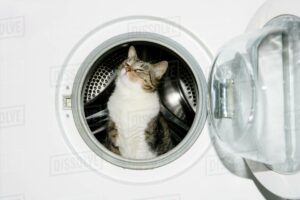
Sources :
http://www.veterinaire-affaires.fr/article-laisser-son-chat-dehors-les-risques-et-les-precautions/
https://jardinage.lemonde.fr/dossier-2443-chat-appartement.html
Interested in adopting a munchkin kitten?
Come and see if we have any kittens available at the moment.

